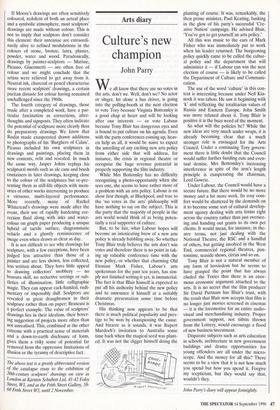Arts diary
Culture's new champion
John Parry
We all know that there are no votes in the arts, don't we. Well, don't we? No actor or singer, let alone a bus driver, is going into the polling-booth at the next election to vote Tory because Virginia Bottomley is a good chap at heart and will be looking after our interests — or vote Labour because Tony Blair has dangerous eyes and is bound to put culture on his agenda. Even with the party conferences coming up, heav- en help us all, it would be naive to expect the unveiling of any exciting new arts policy from either side that will address, for instance, the crisis in regional theatre or recognise the huge revenue potential in properly supporting the film industry.
While Mrs Bottomley has no difficulty recognising a photo-opportunity when she sees one, she seems to have rather more of a problem with an arts policy. Labour is on show first though, at Blackpool, and true to the `no votes in the arts' philosophy will have nothing to say on the subject. This is the party that the majority of people in the arts world would think of as being poten- tially a real supporter of culture.
But, to be fair, what Labour hopes will become an intoxicating brew of a new arts policy is already bubbling away. So whether Tony Blair truly believes the arts don't win votes and therefore there is no point in tak- ing up valuable conference time with the new policy,-or whether that charming Old Etonian Mark Fisher, Labour's arts spokesman for the past ten years, has sim- ply not finished writing-it yet, is immaterial. The fact is that Blair himself is expected to put all his authority behind the new policy and to announce it himself at a suitably dramatic presentation some time before Christmas.
His thinking now appears to be that there is much political popularity and pres- tige to be won by championing the cause. And bizarre as it sounds, it was Rupert Murdoch's invitation to Australia some time back when the magical seed was plant- ed. It was not the digger himself doing the planting of course. It was, remarkably, the then prime minister, Paul Keating, basking in the glow of his party's successful 'Cre- ative Nation' campaign. He advised Blair, 'You've got to get yourself an arts policy.'
All this was music to the ears of Mark Fisher who was immediately put to work when his leader returned. The burgeoning policy quickly came to be called the cultur- al policy and the department that will administer it — if Labour can win the next election of course — is likely to be called the Department of Culture and Communi- cation.
The use of the word 'culture' in this con- text is interesting because under Neil Kin- nock it was taboo. He saw it beginning with 'k' and reflecting the totalitarian values of Russia and Eastern Europe. John Smith was more relaxed about it. Tony Blair is positive it is the buzz word of the moment.
So what will the policies be? While the new ideas are very much under wraps, it is already becoming clear that a much stronger role is envisaged for the Arts Council. Under a continuing Tory govern- ment there is little doubt that the Council would suffer further funding cuts and even- tual demise. Mrs Bottomley's increasing interference in spite of the arm's length principle is exasperating the chairman, Lord Gowrie.
Under Labour, the Council would have a secure future. But there would be no more money and a lot more work. Its cosy com- fort would be shattered by the demands on it to become some sort of cultural develop- ment agency dealing with arts forms right across the country rather than just oversee- ing and handing out grants to its own pet clients. It would mean, for instance, in the- atre terms, not just dealing with the National Theatre, the RSC and a handful of others, but getting involved in the West End, commercial regional theatres, pan- tomime, seaside shows, circus and so on.
Tony Blair is not a natural member of any form of luvviedom but he seems to have grasped the point that has always eluded the Tories that there is an enor- mous economic argument attached to the arts. It is no secret that the film producer Sir David Puttnam has Blair's trust, with the result that Blair now accepts that film is no longer just movies screened in cinemas — it is the locomotive for an entire audio- visual and merchandising industry. Proper government support, not titbits thrown from the Lottery, would encourage a flood of new business investment.
Disparate subjects such as arts education in schools, architecture in new government buildings and drama opportunities for young offenders are all under the micro- scope. And the money for all this? There seems to be a view that it is not how much you spend but how you spend it. Forgive my scepticism, but they would say that, wouldn't they.
John Parry's diary will appear fortnightly.


































































 Previous page
Previous page